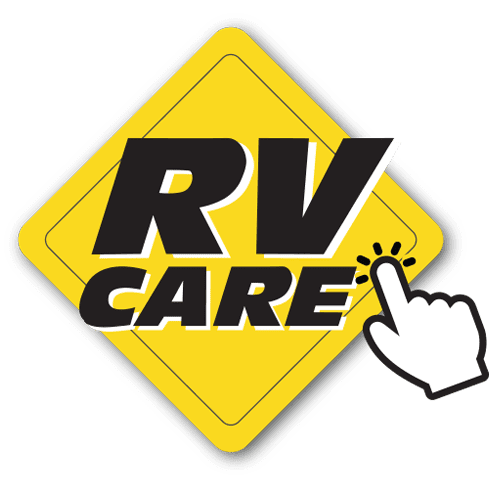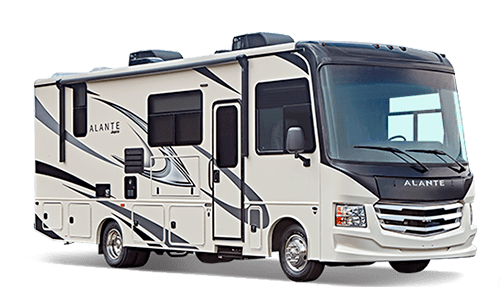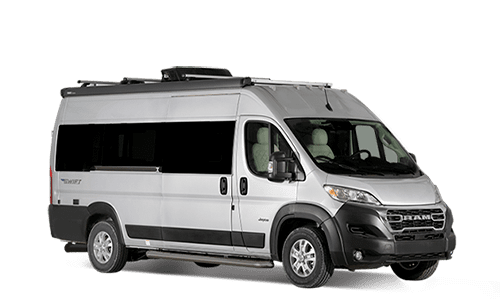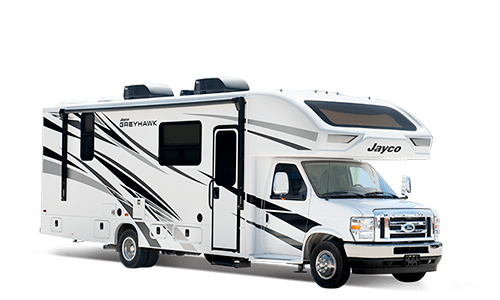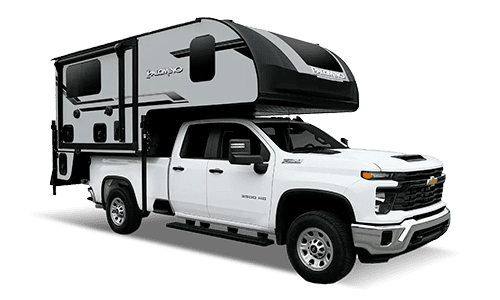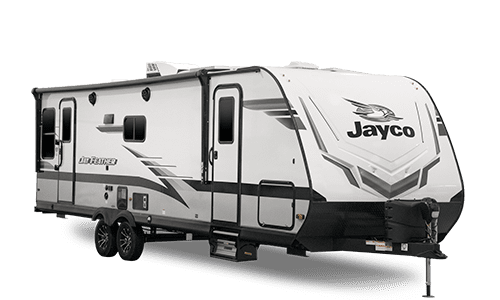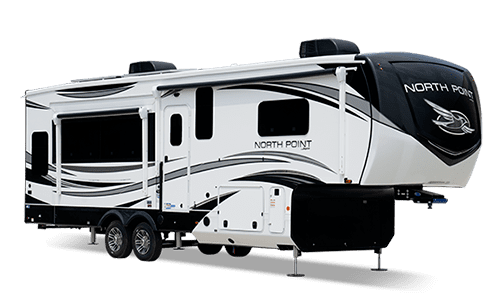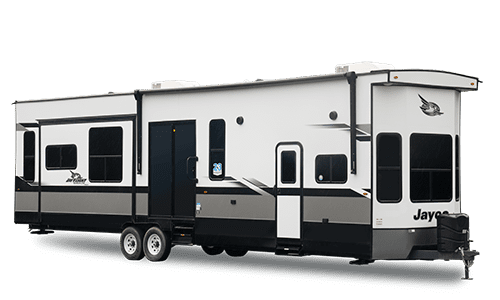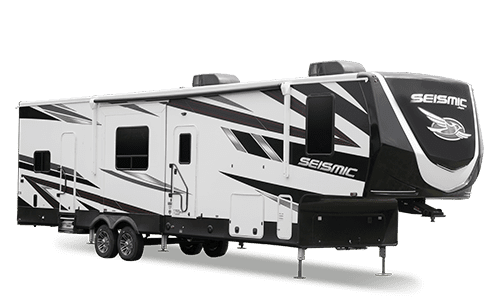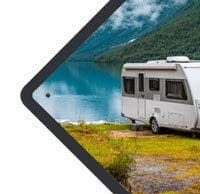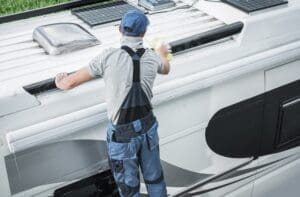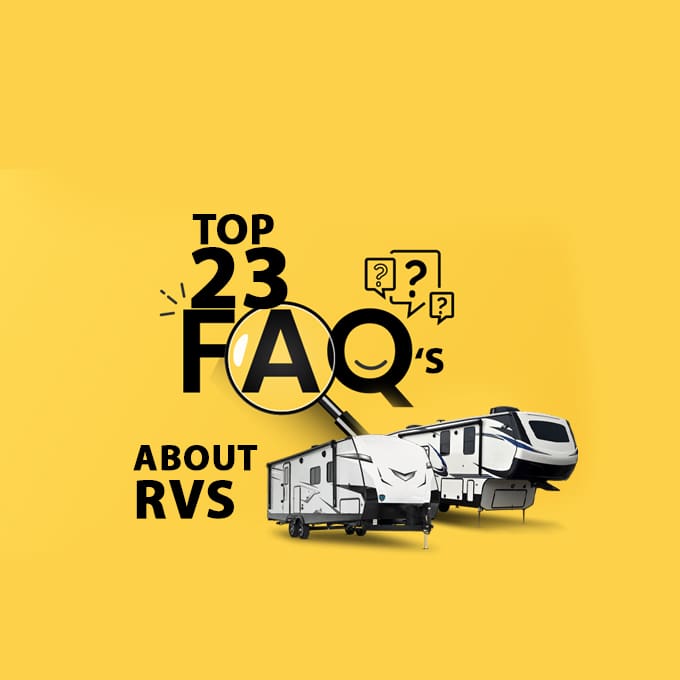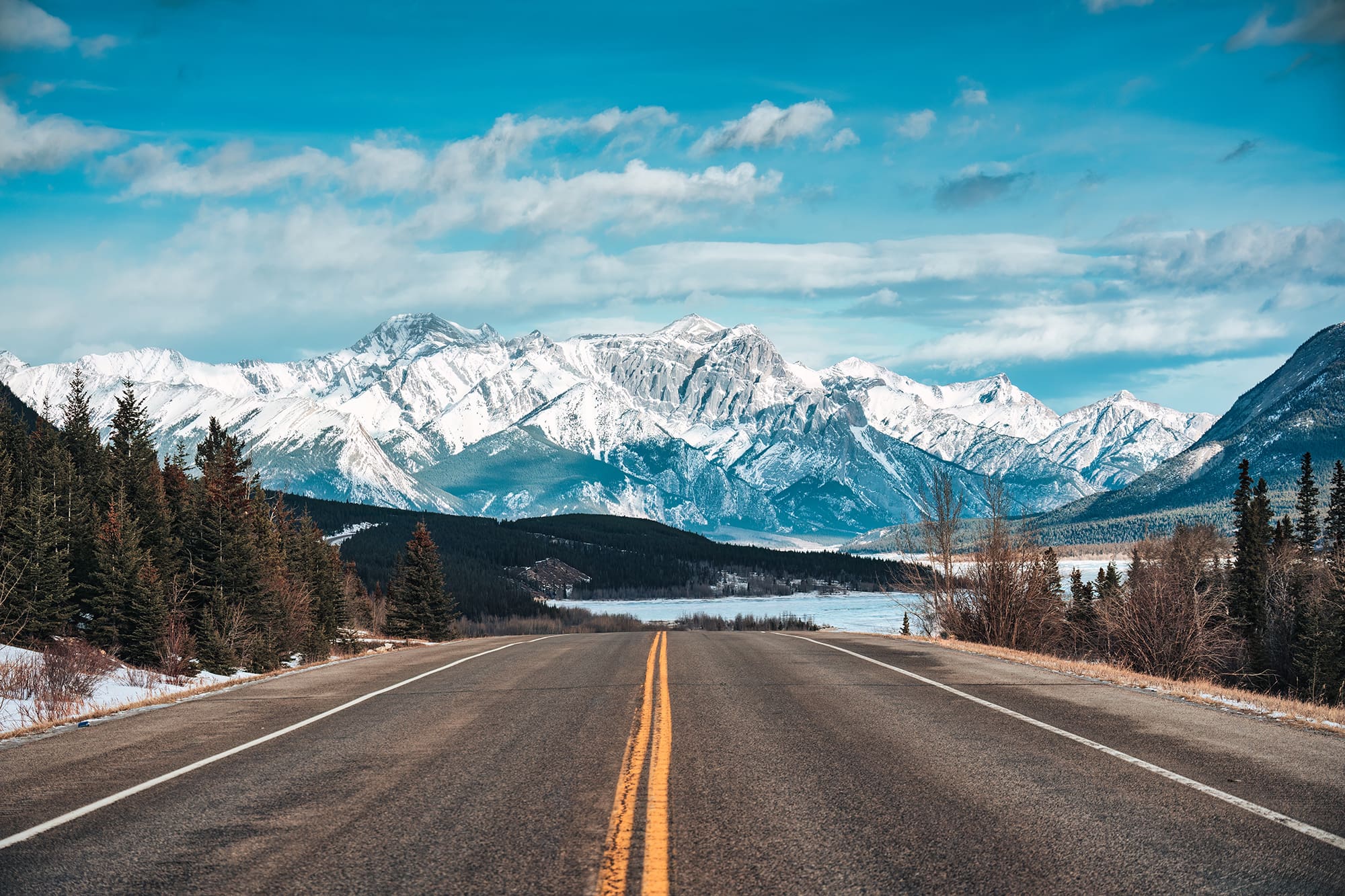1. What do the initials RV stand for?
RV is an abbreviation for recreational vehicle.
If you’re new to the world of RV’s, the amount of choices can be a bit overwhelming. To help you navigate the selection, see our guide.
2. There are many kinds of RV’s. What is the most popular choice of RV in Canada?
The travel trailer is by far the most popular class of RV in Canada and, in fact, all of North America. RV enthusiasts love them because they provide a great balance of affordability, comfort, and versatility. They also come in a wide range of sizes and floorplans, making them suitable for families, couples, and solo travelers alike.
Some reasons for their popularity include:
- Affordability – Travel trailers are generally more budget-friendly than motorhomes.
- Towability – They can be towed by a variety of vehicles, from SUVs to pickup trucks.
- Variety of Sizes – Options range from lightweight teardrops to large, fully equipped trailers.
- Separate Tow Vehicle – Unlike motorhomes, the tow vehicle can be used independently for exploring once the trailer is set up.
At a distant second are fifth wheels, which are popular among full-timers and long-haul travelers, followed by class C motorhomes, which offer a good choice for families desiring a self-contained unit.
3. How much can an RV cost in Canada?
RVs in Canada can range from around $15,000 to upwards of $300,000 and more for luxury models.
4. What about the cost of ownership? How much can operating an RV cost per month?
Monthly costs, including loans, fuel, maintenance, and campground fees, can range from $500 to $2,000.
5. What percentage of Canadians own an RV?
Approximately 15% of Canadian households own an RV.
6. How much does it cost to camp in an RV in Canada?
The cost to park your rig at a campsite can vary by location and available amenities, but the average is around $40 to $60 per night.
7. What qualifies as an RV in Canada?
An RV is a motorized or towable mobile dwelling.
8. What is the purpose of a travel trailer?
As a means to providing a mobile living space for camping, travel, or even full-time living, travel trailers make the unfettered exploration of Canada’s wild open spaces possible.
9. What is another name for a travel trailer?
A travel trailer is also referred to as a caravan.
10. Do RVs require a lot of maintenance?
Like any home or dwelling, RV’s require regular maintenance, but a lot? As the old saying goes, “An ounce of prevention is worth a pound of cure” certainly applies, so periodically check the roof, plumbing, caulking, battery and properly prepare your vehicle for winter storage. Simple, regular upkeep will protect your investment and give you years of RVing pleasure.
For more useful information on maintenance, spring preparation and winterization, read our blogs.
11. What are the regulations for owning and operating an RVs in Canada?
Rules or regulations governing the use and ownership of an RV vary but include vehicle registration, licensing, and adherence to local bylaws for parking and living.
12. Do you need a special license to tow a trailer in Canada?
The short answer is no, you do not need a special driver’s license to tow a trailer in most cases. However, there are some important regulations to be aware of.
- License Requirements – In most provinces, a standard Class 5 (passenger vehicle) license will suffice to tow a trailer, provided that the total weight of the trailer and its load does not exceed a certain limit (often 4,600 kg or 10,000 lbs combined with the tow vehicle). If the Gross Vehicle Weight Rating (GVWR) of the trailer exceeds the provincial limit, you may need an endorsement or a higher-class license, such as a Class 1 (commercial) or Class 3 (heavy vehicle). In Quebec, for example, an F endorsement for trailers exceeding 4,500 kg (9,921 lbs) is required.
- Registration & Plating – All trailers in Canada must be registered and plated through the provincial or territorial motor vehicle authority.
- Insurance – Some provinces require a separate trailer insurance policy, while others include it under the tow vehicle’s insurance.
- Safety Inspections – Utility trailers, boat trailers, and RVs all have specific requirements for safety inspections depending on the province.
- Towing Regulations – Towing laws vary by province, including rules for braking systems (trailers over a certain weight require electric brakes), safety chains, and lighting requirements.
- Speed Limits – Some provinces have specific speed limits when towing.
13. Can I drive an RV in Canada?
Yes, most RVs can be driven with a standard driver’s license, but larger ones may require additional qualifications.
14. Can you live full-time in an RV in Canada?
Yes, but you’ll need to do research on local zoning laws, plus prepare for the seasons.
15. Can you live in a travel trailer in the winter in Canada?
Yes, but it requires proper insulation, heating, and winterization to handle harsh winters.
16. What can I leave in my trailer over the winter?
Remove perishables, electronics, and liquids that can freeze, and secure all items against pests.
See our complete guide for properly winterizing your RV.
17. How do I winterize my RV for winter living in Canada?
Insulate the RV, add skirting, heat water lines, and use a reliable heating system.
Learn how to make your RV comfortable regardless of what the thermometer says.
18. Do travel trailers need to be covered in the winter?
Covering helps protect the roof, seals, and exterior from snow and ice damage.
Read how a quality cover protects your vehicle year-round.
19. How long can a trailer be in Canada?
Trailers can vary in length but typically range up to 46 feet, depending on provincial regulations.
20. Can I take my RV to the USA?
Yes, Canadians can take their RVs to the USA for travel, subject to border regulations.
21. Can a Canadian buy a trailer in the US?
Yes, but it will need to meet Canadian safety standards before import.
22. Can I import a travel trailer from the USA to Canada?
Yes, but you’ll need to follow import regulations, including inspections and duty payments.
23. Are double trailers legal in Canada?
A double trailer refers to a truck or towing setup where a single vehicle pulls two trailers in tandem. In the context of RVs, this can mean:
- Recreational Double-Towing – A pickup truck towing a fifth-wheel trailer, which then tows a smaller trailer (such as a boat or utility trailer).
- Commercial Double-Trailer Trucks – A semi-truck pulling two full-sized trailers, often seen in freight transport.
- Double towing is legal in some Canadian provinces but comes with restrictions on length, weight, and hitch types. Rules vary by province, so checking local regulations is essential.
Ready to start the journey?
We have lots of other resources to get you started on your path to purchase!
